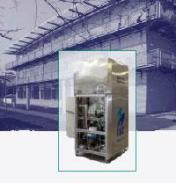Stationary Application
Major application fields for fuel cells are stationary electric power plants and distributed generation. This is mainly related to their high efficiency which is nearly unaffected by size. Decentralised small combined heat and power (CHP) systems and the possibility to feed them with renewable hydrogen make fuel cells highly attractive for future markets. As a result, stationary plant development has been focused on some kW to low MW capacity plants the last years.
CHP – Combined Heat and Power
CHP systems are mostly small modular distributed generation systems that are sited next to their point of use. The usage of heat and power is a more thermodynamically efficient way to use your fuels. It means that beside the electricity generation the thermal energy is also used for district heating or households. The usage of natural gas as a fuel and its wide prevalence makes it easier to distribute and is suitable for pre commercialisation.
The EBZs Fuel Cell Systems are predestined for CHP generation in stationary applications. This way of energy supply takes care of natural resources and fulfils the requirements of feed-in compensation for electricity. The CHP system is highly efficient, emissions reducing, noiseless and reduces the grid utilisation and can reduce cost intensive the grid expansion.
For Residential Buildings …
The integration of fuel cells in heating units for multi-family residences is an ideal application. In heat controlled operation mode electrical power will only be generated as heat is demanded. In contrast to an isolated energy generation, in this mode the fuel cell system operates in parallel to the public grid, which covers occasional peak loads. In cases of rising heat requirements excess power is fed-in to the grid at attractive compensation rates. System heat is handed over at temperatures typical for house heating systems. Common combinations with heat accumulators or solar collectors are advisable, too.
... and Industries
The industrial application offers an even more superior performance. Many technical processes as well as public and social institutions are in need of a high and constant level of heat all the year round, independently of the seasonal heating period. Today conventional boilers or even electrical heating devices cover the demand. CHP systems perform this task without restriction of quality and additionally generates electrical power, which can be used internally or fed-in. One inherent benefit of the SOFC technology is the capability to extract heat on a high temperature level.
Biogas Applications
An interesting alternative for biogas producers and biogas plant operators is the use of the SOFC technology to convert biogas into electricity. The high electrical efficiency, less pollutants (CO, NOX) and the feasibility to operate the system even with diluted biogas is unbeatable. Internal combustion engines for example cannot operate with a CH4 content below 40 %. Due to this advantage and the high electrical efficiency even at part load operation, the SOFC seems to be predestined for biogas conversion.

